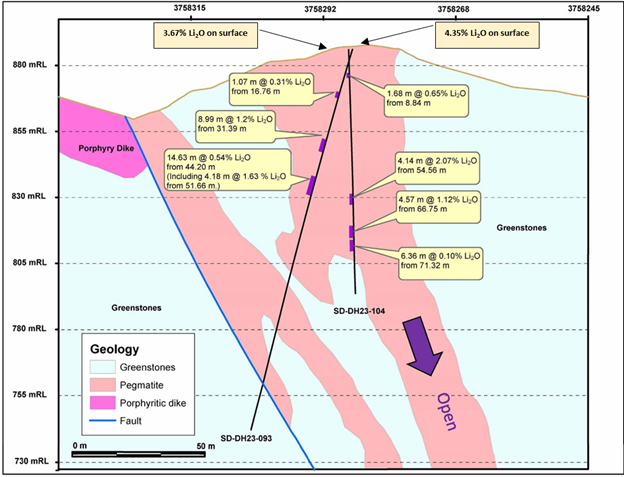Bradda Head Lithium Ltd Announces Additional High Grade Discoveries at San Domingo
Additional Near Surface, High Grade, Lithium Discoveries made at Morning Star Pegmatites in the San Domingo District Play
BRITISH VIRGIN ISLANDS / ACCESSWIRE / January 24, 2024 / Bradda Head Lithium Ltd (AIM:BHL)(TSX-V:BHLI,), the North America-focused lithium development group, announces further results from the Phase 2 core drilling at San Domingo ("SD"), Arizona. This is the third and final set of assays released from the Company's 18,950 feet (5,776m) programme, completed December 2, 2023 and focuses on the Morning Star and Morning Star South targets, located southwest of the Central Targets. The programme has delivered an abundance of encouraging results over the December holiday break.
Ian Stalker, Executive Chair, commented:
"As we reach the end of this current San Domingo drilling exploration program, our objectives have been met and indeed surpassed and, as a result our expectations heightened. It is worth reflecting that total drilled metres at SD, from both programmes is only 13,076 meters, covering less than
"Our portfolio of pegmatites are emerging as viable and potentially extractable near surface resources. The shallow and high-grade intercepts seen at Morning Star are very exciting and we look forward to building 3-D models that may lead to follow-up drilling later this year. The abundance of tantalum, tin, and beryllium are a bonus, potentially adding value to this maiden drill programme at Morning Star. The obvious LCT (lithium-caesium-tantalum geochemical signature, e.g., Kathleen Valley signature) style of mineralisation confirms our belief that we have a formidable district with massive upside potential."
"The fact that Morning Star contains high grade lithium as well as being rich in tantalum, beryllium, tin with massive zones of potassium feldspar means that we could have an exciting, diverse and economic deposit. We have more 3D modeling to explore and, given what we have discovered to date, this could significantly change the way we examine not only Morning Star, but the rest of the San Domingo pegmatite trend within our 33km2 property."
"Parallel to our field work, and complements to our team that delivered these results, we have streamlined our corporate overhead. The net effect of this combined effort - business management and technical know how - means that despite a very poor Lithium market back drop we are now well placed financially and geologically to be able to move with speed and with our in-house skills to grow this investment opportunity. In the meantime, we continue with our 'steady as she goes' approach with no superfluous costs and intend to move back on the resource growth plan at Basin, Arizona."
Summary:
- High grade lithium mineralisation found at intervals such as 4.14m at
2.07% Li2O at a depth of 54.56m in drill hole SD-DH23-104 and 5.40m of1.70% Li2O at a depth of 31.39m in 093, both at the Morning Star pegmatites (all holes are abbreviated from SD-DH23-) - Again, favoured coarse-grained spodumene crystals are observed as the dominant lithium mineral with minor amounts of lepidolite and montebrasite
- Large, cohesive, and mostly vertical pegmatite bodies were verified at Morning Star, which were strongly zoned with massive quartz, fine-grained albite, and minor schorl as well as massive zones of potassium feldspar
- Pathfinder elements of tin, tantalum ("Ta2O5"), and beryllium ("BeO") are found to be highly anomalous in the drilling, such as 6.76m at 145ppm Sn in hole 100, 872ppm Ta2O5 with
0.23% BeO in drill hole SD-DH23-088 over 2.90m - Morning Star drill hole 088 contains high-grade Ta2O5 with an interval of 872ppm Ta2O5 ppm and anomalous tin over 2.90m at a depth of 39.26m and 477 Ta2O5 ppm over 5.34m at 75.74m depth
- Lithium, plus the bonus of ore grade Ta2O5with discrete anomalous tin and BeO in the Morning Star drill holes in a shallow environment, bodes well for the potential of open cut mining.
Results from the Morning Star and South Morning Star targets are highlighted by the following intervals:
- 4.14m at
2.07% Li2O in drill hole 104 at Morning Star - 5.40m of
1.70% Li2O followed by 4.18m of1.63% Li2O (within 14.63m at0.54% Li2O) plus 0.67m of1.21% BeO, all above 55.93m depth in drill hole 093 at Morning Star - 5.55m of
1.03% Li2O in hole 099 at South Morning Star - 6.67m at
0.82% Li2O in drill hole 100 at South Morning Star - 2.01m at
1.84% Li2O in drill hole 091 at Morning Star - 2.80m at
0.65% Li2O in drill hole 090 at Morning Star - Morning Star surface samples of
4.35% and3.67% Li2O above holes 093 and 104 highlight open pit potential - Wide-open potential >100m depth, virtually unexplored by this second program and presents impressive opportunities district wide

Figure 1: Cross section through Morning Star, drill hole SD-DH23-093 and SD-DH23-104 high grade intercepts, surface samples up to
Please click on the below link to view the full announcement.
http://www.rns-pdf.londonstockexchange.com/rns/7456A_1-2024-1-24.pdf
This information is provided by RNS, the news service of the London Stock Exchange. RNS is approved by the Financial Conduct Authority to act as a Primary Information Provider in the United Kingdom. Terms and conditions relating to the use and distribution of this information may apply. For further information, please contact rns@lseg.com or visit www.rns.com.
SOURCE: Bradda Head Lithium Limited
View the original press release on accesswire.com






